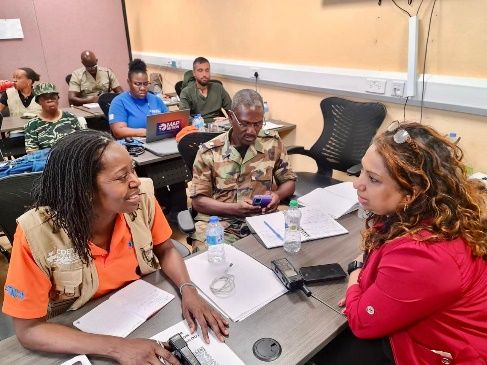CARPHA Provides Health Response Support to Hurricane Devastated Member States
CARPHA Media Release
Port of Spain, Trinidad and Tobago. July 17, 2024. The Caribbean Public Health Agency (CARPHA) began its regional response to hurricane-impacted Caribbean Islands on July 1, 2024. Hurricane Beryl made landfall in the Caribbean as a Category 4 Hurricane on July 1, causing significant destruction and impacting on lives and livelihoods. Beryl affected Barbados, Grenada, Saint Lucia, St. Vincent and the Grenadines, Tobago, Cayman Islands and Jamaica resulting in fatalities, injuries, floods, and extensive damage to infrastructure including healthcare facilities. In some islands like Carriacou and Petite Martinique of Grenada, and Union Island of St. Vincent and the Grenadines, more than 60% of homes have been damaged or destroyed, leaving many without shelter, food, water, electricity.
Recovery, post Beryl, necessitated a rapid, multi-disciplinary response of which public health is a vital component. The post disaster health consequences of heavy rains, floods, and large numbers of displaced persons in crowded shelters, increases the likelihood of infectious disease spread; food, water and vector borne diseases; mental health issues; and a strain on health systems.
In this regard, CARPHA, given its mandate for public health response to emergencies, is supporting the regional health response, as part of the Caribbean Disaster Emergency Management Agency (CDEMA)-led Regional Response Mechanism, as well as coordinating with Member States and international organisations.
CARPHA’s comprehensive response includes rapid needs assessment, laboratory, surveillance and response, technical guidelines, prevention and control of infectious diseases, health and safety promotional materials, and shelter surveillance tools. The Agency’s response also includes offering a Health Emergency Response Package to impacted islands - surveillance, laboratory, food safety, vector borne, water, sanitation and hygiene, and risk communications.
CARPHA deployed technical staff to support the assessments of shelters, health facilities and the public health situation in Grenada as part of the CDEMA-led Rapid Needs Assessment Team (RNAT) during July 6-12 and is aiming to deploy next week to provide support to the Ministry of Health particularly in daily shelter surveillance, and other health emergency and response needs. Tools for digital real time shelter surveillance are being enhanced as well.
Dr. Lisa Indar, Ad Interim Executive Director at CARPHA together with Ms. Elizabeth Riley, Executive Director, CDEMA also conducted assessments in Carriacou and Petit Martinique, and provided guidance on response to The Honourable Dickon Mitchell, Prime Minister of Grenada; The Honourable Philip Telesford Minister of Health, and their teams; and the Emergency Operations Center.
“CARPHA’s multisectoral Rapid Response Team stands ready to provide immediate support in surveillance, food, water and environmental safety and vector-borne disease control to our Member States. Our regional referral laboratories are also ready provide rapid testing of clinical, food, water and environmental samples as needed,” stated Dr. Indar.
Funded through the Pandemic Fund grant, CARPHA is procuring a package of essential public health supplies to prevent/reduce diseases outbreaks for the impacted countries. This includes rapid tests to complement epidemiologic surveillance, supplies to promote water, sanitation, hygiene, food safety, and vector control, and personal protective supplies, that could be used at the collective level during health emergencies.
The Caribbean Meteorology and Hydrology Institute (CIMH) predicted an early start to the 2024 Hurricane season with above normal seasonal projections for the frequency and intensity of storms.
As such, CARPHA cautions affected Member States, and the broader region, to concentrate on response and recovery efforts, and to prepare for future events.
CARPHA remains committed to working with CDEMA and other regional and international agencies to ensure a well-coordinated, effective health and disaster response to the hurricane-affected Member States. The Agency has developed technical guidance including (i) CARPHA’s Emergency Response Package for Hurricane Impacted Member States, Post-Hurricane Beryl, (ii) CARPHA Shelter Surveillance Guidelines (iii) Guidelines for portable toilets. Additionally, a suite of food safety and other health measures promotion materials that are being printed for distribution.
A social media campaign with relevant messages on health, vector-borne, food and safety has been launched on CARPHA platforms - Facebook, Instagram, X (Twitter), and LinkedIn.
Media release courtesy of Caribbean Public Health Agency (CARPHA).
.jpg)

.jpg)
.jpg)